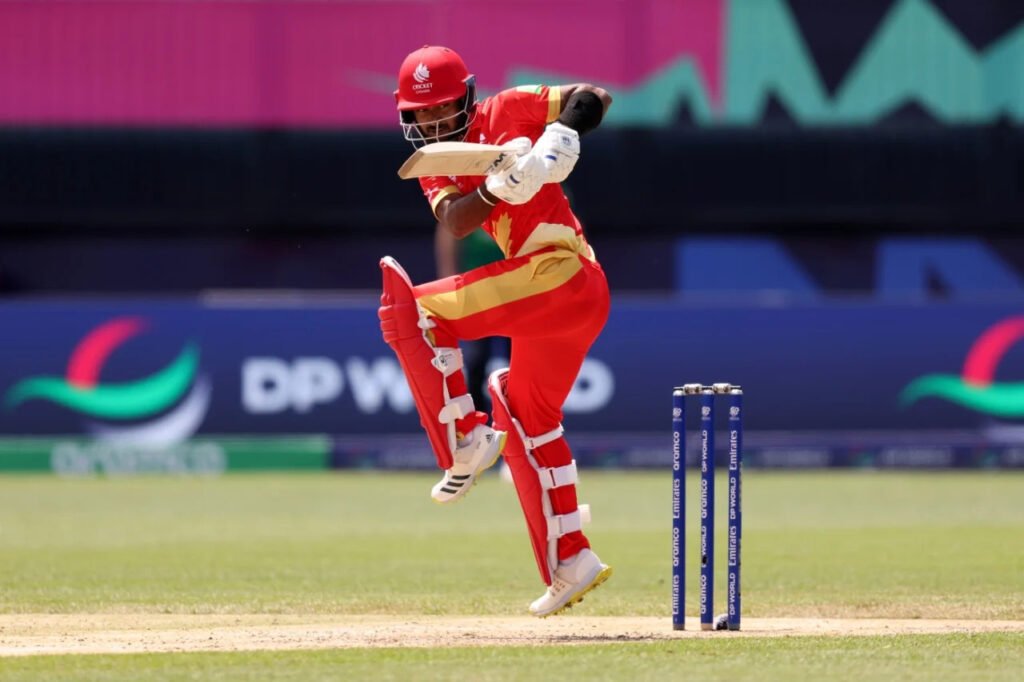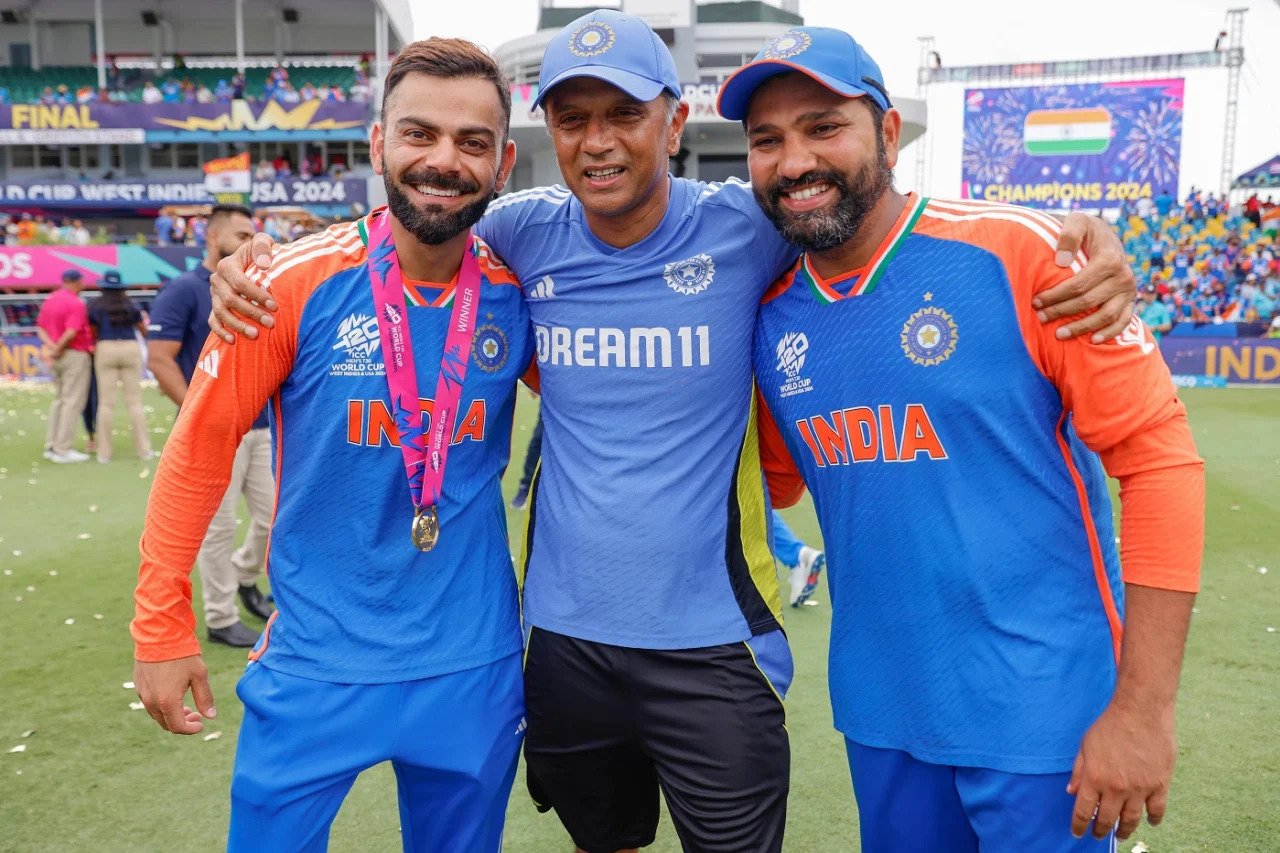Canada secured their first-ever T20 World Cup victory by defeating Ireland by 12 runs.
This win comes hot on the heels of another upset in Group A, where Pakistan defeated the USA. Canada’s victory was highlighted by stellar performances from Nicholas Kirton, Jeremy Gordon, and Dilon Heyliger, showcasing the rising talent in Associate cricket.

Ireland’s 125 for 7 (Adair 34, Dockrell 30*, Gordon 2-16, Heyliger 2-18) was defeated by Canada 137 for 7 (Kirton 49, Movva 37, McCarthy 2-24, Young 2-32) by a margin of 12 runs.
In the last two days, the Associate has struck twice. Group A is currently producing the incredible performances, despite Group C and D perhaps being the groups of death prior to the T20 World Cup in 2024. Following Pakistan’s stunning victory over the USA in Dallas on Thursday, Canada stunned a Full Member team on Friday by defeating Ireland by 12 runs in New York to win the T20 World Cup for the first time ever.
In New York, all eyes were on the surface. Although things didn’t go well for Canada at first, Nicholas Kirton and Shreyas Movva steadied the ship, helping them to 137 for 7 in their 20 overs. This World Cup, this was the first time a team had crossed the 100-run barrier in New York in five innings. It turned out to be sufficient.
Ireland’s hitters were completely outclassed by the Canadian bowlers in the chase. Before Saad Bin Zafar and Junaid Siddiqui put the squeeze on them in the middle overs, they did not allow them to escape on the powerplay. It looked all but over for Ireland as they fell to 59 for 6 in the thirteenth over. Jeremy Gordon and Dilon Heyliger held their own at the end to give Canada a historic victory, but Mark Adair and George Dockrell rallied the Irish innings and put on 62 for the seventh wicket. Ireland lost both of their matches after being limited to 125 for seven.
Chasing 138 on an uneven pitch with a lethargic outfield was always going to be difficult. The early movement was not well controlled by Kaleem Sana, which did not bode well for Canada’s defence. However, Gordon was aware of the risks involved in bowling on the surface right away, and the other bowlers adopted this strategy as well. In the first six overs, Ireland could only muster two fours, one in the opening over and one in the sixth. Between, there were very few good contacts and a lot of swishes and misses from Paul Stirling and Andy Balbirnie.
In the last over of the powerplay, Stirling could only get a top edge on his attempted heave, with the wicketkeeper making an easy catch thanks to Gordon’s unrelenting lengths. After he fell for an unusual 9 off 17, Ireland’s innings took a turn for the worst.
For the next seven overs or so, Ireland was completely outmatched by Canada, who had no idea how to pursue the ball. Based on data from ESPNcricinfo, Saad and Siddiqui attacked the stumps, giving the hitters very little to work with. Of the 48 balls they bowled, 33 ended on a wicket-to-wicket line. In the second half, the surface appeared to slow down a little, and the two spinners made sure to take its toll.
After the powerplay, Balbirnie was bowled by Siddiqui after he was caught. The next to score was Saad, who beat Harry Tector’s defenders with a direct ball. In the tenth over, Lorcan Tucker bizarrely got out on a deep backward square leg dive to his left, and Heyliger then removed Curtis Campher with a little assistance from Aaron Johnson. And an early finish looked certain when Ireland’s Gareth Delany fell in the 13th over with their score at 59.
Also Read: USA vs Pakistan Super Over Showdown: A Thrilling Cricket Encounter Unpacked in T20 World Cup

Ireland required a miracle to win this match, as the equation read 64 off 30 after 15 overs and just four wickets remained to be claimed. In the sixteenth over, Dockrell gave Ireland a chance by hitting Siddiqui for a four and a six, and in the following over, Adair achieved a similar feat against Sana. But Heyliger held his composure and gave up just eight runs in the eighteenth over.
After Sana’s 19th wicket fell for 11, Gordon had to defend 16 runs in the last over. And with skill, too. Adair had no control over the hard-length stuff; there were no whole balls. He played, top-edged the following ball, and missed the first. Barry McCarthy entered and crossed the boundary three times, but he was unable to accomplish much.
And there were cheers in the Canada dugout when Dockrell mistimed his heave to long-on off the final ball. Canada had only defeated Ireland in Twenty20 Internationals once before. In the format, they have defeated only one other Full Member team.
Earlier, Ireland appeared to have a strong chance of winning as their bowlers were finding movement and carry. Before Craig Young sent Aaron Johnson back, caught at deep backward square leg, Adair had Navneet Dhaliwal caught at backward point. Despite hitting six fours during the powerplay, Canada was only able to reach 37 for 2 after the first six because of a lack of strike rotation.
Following the powerplay, Young also scored quickly, dismissing Pargat Singh. Delany then trapped and bowled Dilpreet Bajwa, bringing Canada’s score after 8.1 overs to 53 for 4.
Kirton has recently been playing fantastic T20I cricket. He had hit two fifties in the World Cup opener, one against the USA and the other against Nepal in Canada’s warm-up match. And in New York, he got off to a similar start. He steadied the Canada innings alongside Movva, then went off in the last five.
The strokeplay of Kirton, who was born in Barbados, had a decidedly Caribbean flavor. In the sixteenth over, he took on Young, who had been Ireland’s most successful bowler up to that moment, hammering him for two sixes and a four. ahead with the pair as they added 75 runs for the fifth wicket off 63 balls, Movva continued to chugg ahead.
Kirton missed a second half-century, but Movva remained in the game until the very end, helping Canada record the greatest score in the T20 World Cup in New York.





